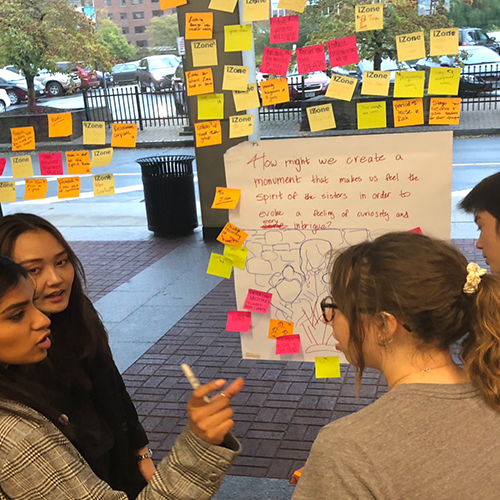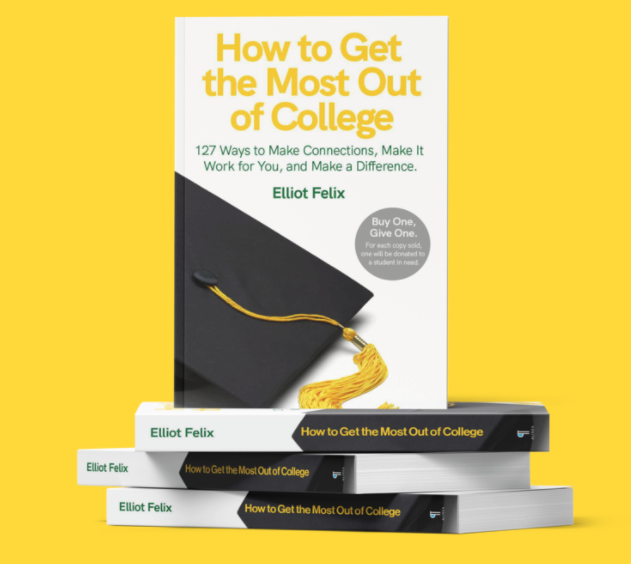Whether it’s on a college campus or in an elementary classroom, we build belonging together. That’s why we are so excited to introduce you to Elliot Felix of brightspot. Elliot has been an architect of belonging since he was young. Serving on student government as an undergraduate and graduate student, he learned that what was happening outside the classroom was just as important as what was happening inside of the classroom and that there were opportunities to build belonging in all spaces.
Together with his now wife and other student leaders, they conducted town halls and surveys to unearth what students experienced and find ways to improve spaces, schedules, pay, and culture. After bringing their findings to administration, they achieved real, tangible changes to improve the student experience and sense of belonging on their campus. “[We] stepped up and filled the vacuum, filled the void,” Elliot shares. They helped students feel seen and celebrated.
Elliot wanted to continue this invaluable work beyond his own time as a student. He founded brightspot, an organization that helps colleges and universities create structures to ensure students have engaging, equitable, and sustainable undergraduate experiences. Now as a consultant for universities, his passion for seeking belonging happens on an even larger scale, helping college students of all identities and lived experiences engage more fully in their communities and reach their potential.
brightspot has worked with over 100 colleges and universities. “I’ve seen how students struggle to feel a sense of belonging,” Elliot says. “I’ve seen how students struggle to get the support they need. I’ve seen students not connect their classes with a career and so miss out on finding a sense of purpose or finding their people.” His team helps clients identify school and student needs by rebuilding learning and student support processes. Using evidence-based approaches, they explore ways to incorporate personal and community development into the classroom and across the campus.

Together, they create the conditions and spaces where all students can be celebrated and affirmed for all of who they are, while connecting fellow students and community members with both shared and different identities and experiences. “We’re helping to build systems that foster community,” he shares. They invest resources into universities’ libraries and affinity groups, providing students with pathways to succeed in and outside of school. In doing so, they help students find belonging and get the most out of their college experience.
Having moved to Minneapolis during the pandemic, Elliot is now an architect of belonging with his wife and kids in a new neighborhood and new schools. His oldest child, Nora, uses AmazeWorks anti-bias curriculum in her elementary classroom. Like the students Elliot works with, Nora is being emboldened to reassess learning norms and develop meaningful relationships.
One moment in Nora’s educational journey stands out to Elliot. When practicing test questions, they came across this problem: Dan has 5 balloons, and he pops 3 of them. How many balloons does Dan have? Nora responded, “Why did he pop the balloons?” Elliot admires his daughter’s inclination to think more critically about problems.
“We could have our kids focus on the balloon numbers, or we could ask our kids to ask more creative questions,” Elliot says. “What’s going on with Dan? Why did he pop the balloons? If we can help kids build empathy and creativity, I think we’ll be okay.”
This kind of thinking gives Elliot hope for his daughter’s future and the future of our education system as a whole. He’s noticed an awareness and language his daughter uses to understand her identity and the identities of those who are different from her. She notices bias and challenges assumptions without hesitation, regularly interrupting to say, “not always!”
By giving kids like Nora the tools to develop respect across differences and notice, name, and reject bias, AmazeWorks helps children build belonging. brightspot continues to expand upon that foundation at the undergraduate level, giving students the tools to assemble whole communities. These building blocks of belonging transform classrooms at every age level, allowing students to show up as their full, authentic selves and reach their full potential.
“Belonging and justice are outcomes. Diversity and inclusion are inputs to get those outputs. If you just stop at the inputs, you haven’t really accomplished much,” Elliot shares. His experiences with brightspot, his daughter’s learning, and his own undergraduate career have all reinforced this belief.
We couldn’t agree with you more, Elliot! Thank you for working towards the outcome of belonging for all with us. It takes a village, and we are so grateful to build belonging alongside you.
If you’d like to know more about Elliot Felix’s work with colleges and universities, you can find more information here. You can also purchase his book, How to Get the Most out of College: 127 Ways to Make Connections, Make it Work for You, and Make a Difference, is a wonderful resource full of practical wisdom, guiding students toward a sense of belonging and empowering them to not just survive, but thrive during their academic journey and beyond.

As we embark on a new calendar year, how will you be an architect of belonging?